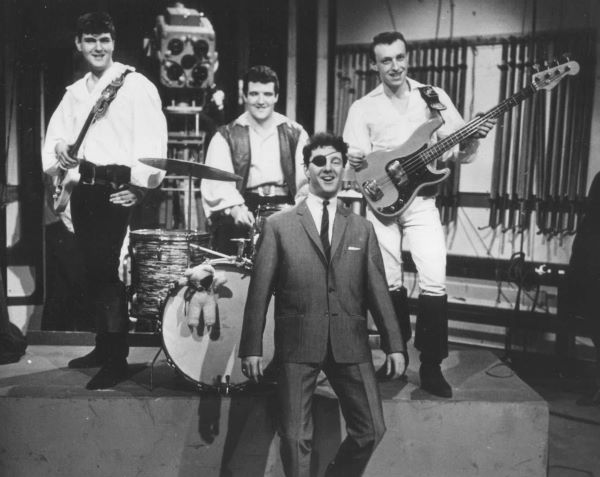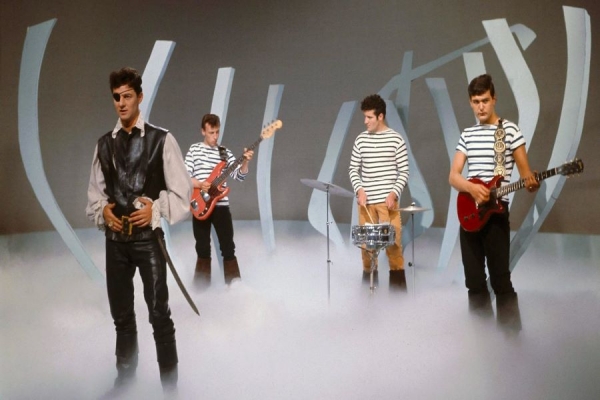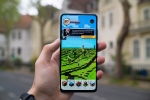Rock ‘n’ Roll Legends - Johnny Kidd and the Pirates
Written by Cameron KFreddie Heath (1935 - 1966 ) joined his first group which was a skiffle outfit called "The Frantic Four" then later "The Five Nutters. "
The group covered primarily played skiffle, pop, and rockabilly. When the skiffle fad passed Freddie formed the Pirates in 1959 with Alan Caddy, Tony Docherty, Johnny Gordon, and Ken McKay. The band would dress in pirate regalia and Freddie adopted the stage name Johnny Kidd and always wore an eye patch (not always over the same eye). Their first single release 'Please Don't Touch' (written by Johnny Kidd) managed to reach the chart, but the follow-up did less well and their third single 'You Got What It Takes,' was overshadowed by a version by Marv Johnson.
In the pre Beatle days and post-Rock’n’Roll, UK record companies were unsure whether to allow the wild live performances from acts like Johnny Kidd and the Pirates and Billy Fury to be captured onto vinyl. Consequently, Johnny Kidd and the Pirates were constrained to meek cover versions. This is a great pity since they were a very competent group and could with better management have been more influential than they were. None the less Johnny Kidd and the Pirates were a superb live act and a model to many that followed. The Pirates lineup gradually changed and Brian Gregg (bass) and Clem Cattini (drums) replaced Johnny Gordon and Ken McKay. Now Johnny Kidd and the (new) Pirates saw their first real chart success with Shakin' All Over.

The famous guitar riff was played by session man Joe Moretti (subbing for Alan Caddy). "Shakin' All Over" started off as a hurriedly composed b-side, thrown together in a matter of minutes. The single represents one of the best UK rock’n’roll songs, pre Beatles. The popularity of beat music in the early 60s saw more lineup changes and in 1961, Johnny Patto (guitar), Johnny Spence (bass), and Frank Farley (Drummer) moved into key positions. In the next year, Mick Green replaced Johnny Patto who had grown tired of touring. It was Mick Green’s guitar which featured prominently in “I’ll never get over you.”
Johnny Kidd and the Pirates were popular among other musicians and made their living playing clubs and smaller concert venues. Unfortunately, they were never able to sustain their recording success past the early '60s and when Johnny Kidd died in a car accident on October 7th, 1966 near Bolton (UK), the band broke up. Many rock historians consider Kidd's UK Top 50 disc "A Shot Of Rhythm And Blues" c/w "I Can Tell" (1962) to be the bridge between British Rock and Roll and British Beat /British R&B.
Mick Green was a well-respected musician and his guitar style on the Fender Telecaster Deluxe was to mix lead and rhythm parts which became an inspiration to others including, Pete Townshend, Tony Hicks (Hollies), and Wilko Johnson (Dr Feelgood). Before the accident, Mick Green had left the Pirates and joined the Dakotas. His presence made them one of the most respected Mersey Sound groups and he stayed with them until they broke up in 1967. Mick Green went on to work with Cliff Bennett and Englebert Humperdinck before joining the reformed Pirates in 1976. A trio of Johnny Spence, Mick Green, and Frank Farley got together for a one-off reunion however such was the audience reception, the band stayed together until 1983.
The Pirates became a cult band with a strong following. Their live repertoire included punk, rockabilly, blues, and classic rock & roll. Mick Green (1944 – 2010) subsequently worked with Paul McCartney, Van Morrison, Bryan Ferry, and Peter Green.
Worth a listen
Please don’t touch (1959)
Shakin’ all over (1960)
Shot of Rhythm and Blues (1962)
I’ll Never Get Over You (1963)
Ecstasy (1963)
Used with Kind Permission and Thanks
Cameron K
Latest from Cameron K









